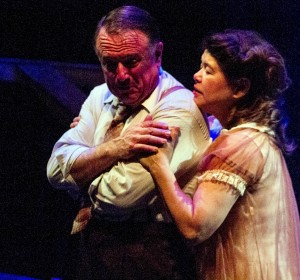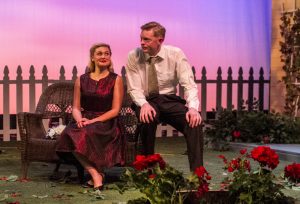Intrepid’s ‘All My Sons’ works in spite of itself
If nobody gave you a hint, you maybe wouldn’t guess that Arthur Miller wrote All My Sons in 1947—but if you’re a Miller fan, you can tell it’s one of his earliest works. The marvelously descriptive Death of a Salesman, the strangely patriotic The Crucible and the two-fisted A View from the Bridge would come later, bathed in the seas of metaphors and common-man allegories that made Miller one of the American 20th century’s four or five playwriting elite. All My Sons feels unrefined by comparison. Miller spoonfeeds us his scenes two and three times amid lackluster dialogue, and our own sense of adventure be damned.
Having said that, I’m sending you to Intrepid Shakespeare Company’s current stab at the play amid one of this theater season’s more pleasant surprises. This cast, God bless it, does some pretty remarkable things with some pretty unremarkable material—the personnel see the dialogue for what it is and quietly play through its weaknesses, their patience and gifts for understatement leaving to our imaginations what Miller doesn’t supply.
With a lesser company, this terse script is better off as a staged reading—with this group, we may have to look a little bit for vintage Miller, but there he is in the distance.

There’s a day of reckoning ahead for Joe Keller (Tom Stephenson) and his wife Kate (Savvy Scopelleti), and man, it’s gonna leave a mark. (Photos by Daren Scott)
1947 was an auspicious time for the play’s debut, as the story takes into account a global conflict that ended just two years earlier. Retiree Joe Keller ran a manufacturing plant that exported faulty airplane parts, resulting in the deaths of U.S. pilots during World War II. The hell of it is that Keller knew about the ploy all along even as his partner took the rap and went to prison.
Meanwhile, Joe’s son Chris has taken up with Ann, former fiancée to Chris’ airman brother Larry, who’d disappeared in combat several years earlier. The relationship is uproarious for Chris’ fragile mother Kate, who unreasonably holds out hope that Larry’s still alive. The stage is thus set for Joe’s tragic epiphany, prompting him to declare the dead servicemen “all my sons” through uncontrollable spasms of guilt.
I only know about World War II through history books and TV, but even to once- and twice-removed people like me, the war most definitely had a cause. To that extent, All My Sons takes on the appearance of a public service, assailing the corporate greed that sullied Western righteousness. The problem is that Miller’s speeches, especially in context, grossly understate the war’s import amid their lack of substance and imagery (“You marry that girl, and you’re pronouncing him dead”; “The train leaves at 8:30”; “He’d be 27 this month, and his tree blows down”; “He didn’t tell me any more than he told you”).
What’s more, Miller’s setting is incomplete in one vital respect: For all their well-drawn personal traits, the subtext characters virtually never mention the fighting, breezing through their middle-American lives as though every day’s a Saturday. This in a country that two years ago paid an immeasurable price in turning back three of the ghastliest monsters ever to mark the path to civilization?

Ann and Chris (Jacque Wilke and Brian Mackey) struggle to find a ray of light amid two family tragedies.
But wait. Look over there, just past the white picket fence that stretches the width of the set. Why, it’s director Christy Yael-Cox, whose handle on the characters translates into a solid command of the play’s intent. She’s passed it along to her already seasoned crew, who knows very well what to do with it. Veteran Tom Stephenson is an unassuming Keller, while Savvy Scopelleti adds a nice downcast to her shaky Kate. Brian Mackey has some of the most undramatic speeches in the show, but he plays his Chris extremely close to the vest lest the nondescript dialogue fuel the role. Jacque Wilke is her usual thorough self as the highminded but misguided Ann. Everybody else is fine, although Miller gives their characters scant little to work with as products of the war.
Yael-Cox’s good sound and set (especially its ridiculously high second story) add to the cavernousness that Curtis Mueller’s lights evoke. I liked costumer Kristin McReddie’s use of color—the intensities are stylized, but restrainedly so.
Darko Tresnjak, a former Old Globe Theatre artistic director and now in the same position at Hartford (Conn.) Stage, has said that some of his favorite projects involve “bruised beauties,” plays whose merits shine through the missteps with a little judicious directing (anybody who can save The Globe’s Bell, Book and Candle the way Tresnjak did in 2007 can stop a Martian invasion). The trick is to pull your actors back from the errors, letting them play out gracefully so as to de-emphasize their intrusions. For better or worse, that’s what Yael-Cox and her crew have done here, and they’ve done it surprisingly well. All My Sons is a geeky slog of a script, but that doesn’t mean this is a terrible show.
This review is based on the matinee performance of April 6. All My Sons runs through April 19 at the Clayton E. Liggett Theatre in the San Dieguito Academy Performing Arts Center, 800 Santa Fe Dr. in Encinitas. $25-$35. 888-71-TICKETS, intrepidshakespeare.com.

Martin Jones Westlin, principal at editorial consultancy Words Are Not Enough and La Jolla Village News editor emeritus, has been a theater critic and editor/writer for 25 of his 47 years…
More…
